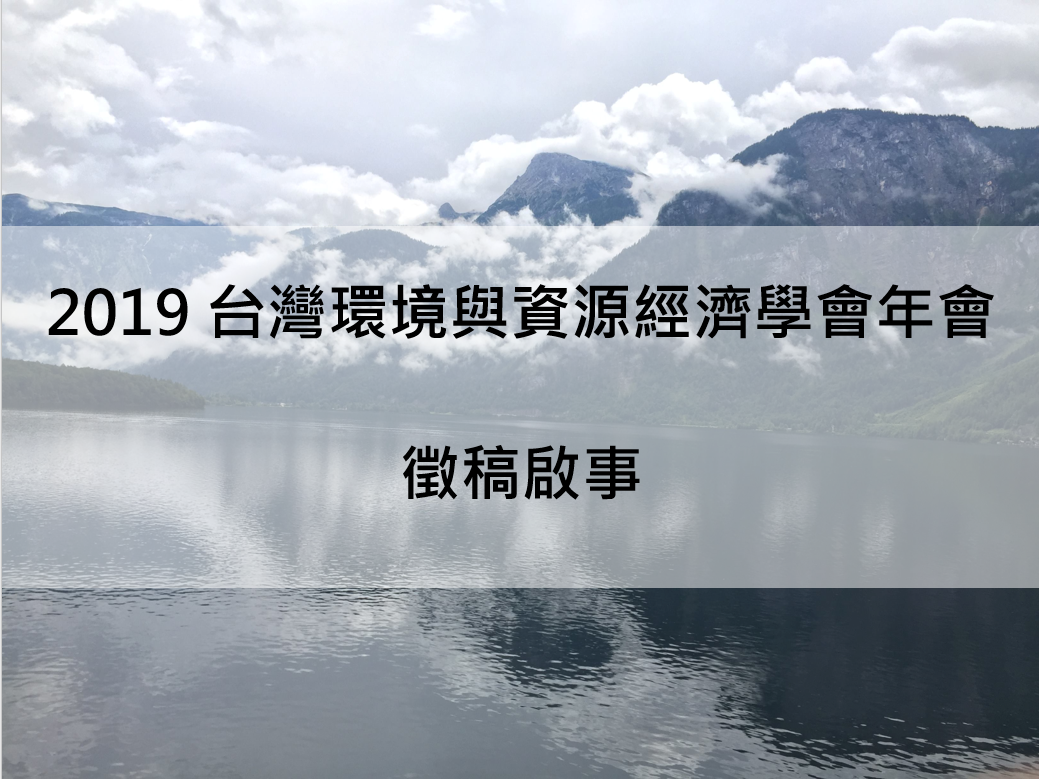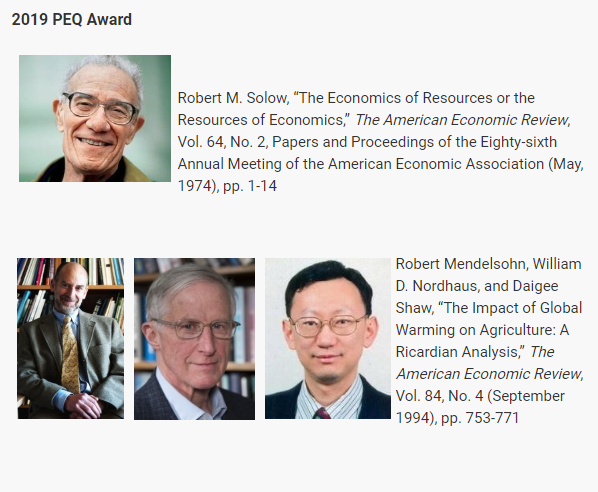2021 TAERE Summer School 台灣環境與資源經濟學會暑期課程
- 詳細內容
- 分類:暑期課程資訊
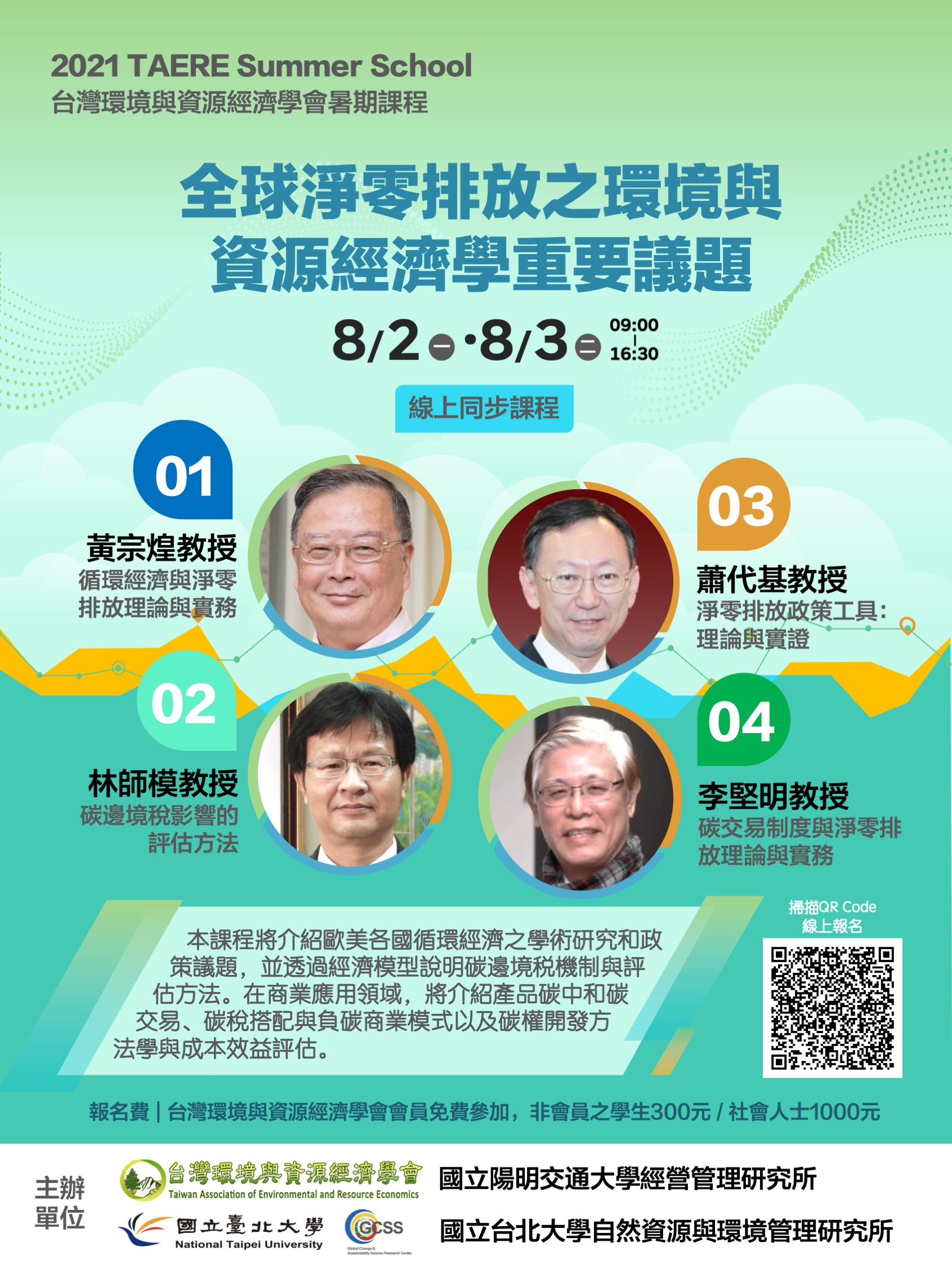
2020TAERE年會暨綠色復甦與氣候韌性學術研討會
- 詳細內容
- 分類:歷年研討會資料下載
台灣環境與資源經濟學會2020年會
綠色復甦與氣候韌性學術研討會
2020Annual Conference of Taiwan Environmental and Resource Economics AssociationMain Theme: Green Recovery and Climate Resilience
時間: 2020年12月12日(星期六)
地點:淡江大學守謙國際會議中心(新北市淡水區英專路151號)
線上報名:https://www.beclass.com/rid=2443ea15fb8b758208fa
議程:下載年會議程
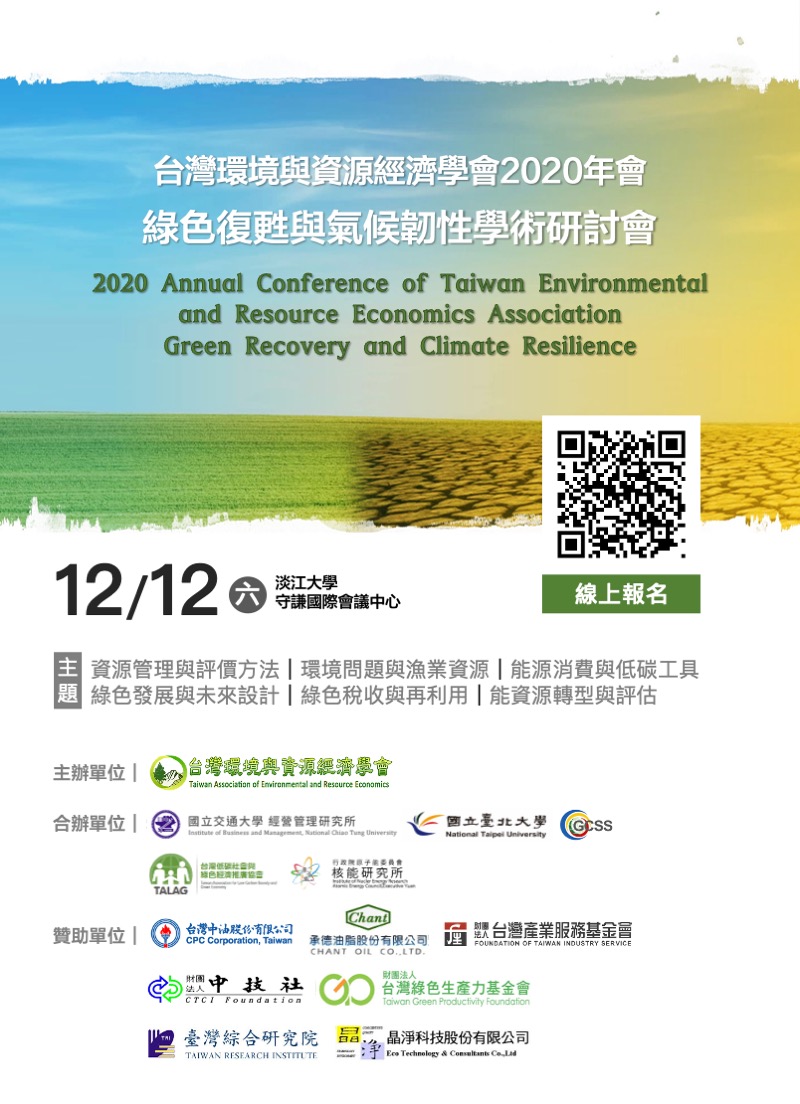
議程大綱
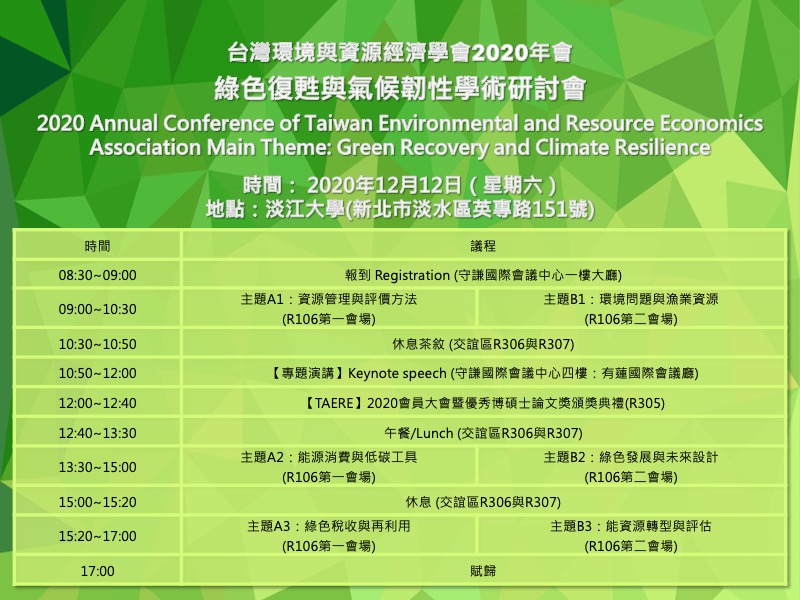
交通資訊
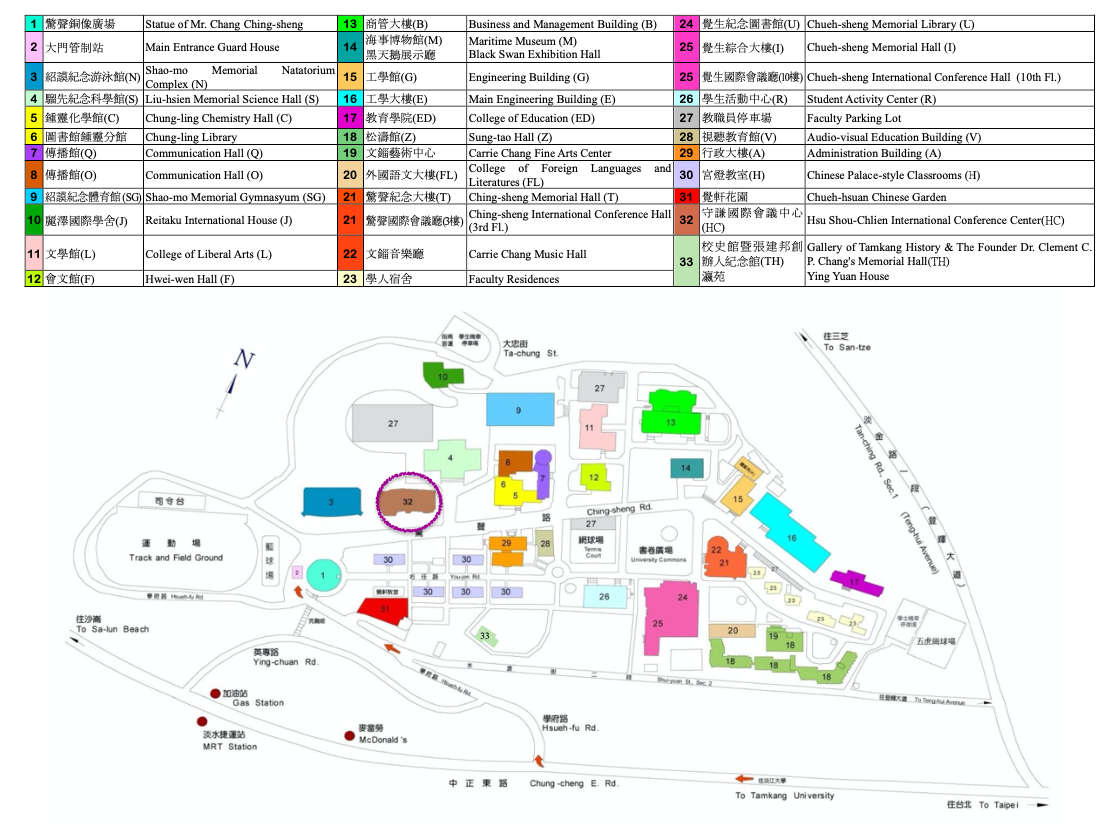
2019 台灣環境與資源經濟學會年會(2019 Annual Conference of Taiwan Association of Environmental and Resource Economics)
- 詳細內容
- 分類:活動訊息
徵稿啟事
2019年 TAERE 台灣環境與資源經濟學會年會
時間:民國108年12月14日8:30-17:40
地點:輔仁大學 (新北市新莊區中正路510號)
親愛的會員:
2019年台灣環境與資源經濟學會將於民國108年12月14日
在輔仁大學(新北市新莊區中正路510號) 舉行年會,
我們誠摯的邀請您投稿環境與資源經濟的理論與實證文章。請由此處前往投稿。
議題與發表語言
與環境與資源經濟學相關之理論、實證、政策議題皆歡迎。
本次會議將同時包含中文及英語發表場次,亦開放海外專家學者投稿報名參加。
投稿指南
投稿摘要請勿超過兩頁,
投稿全文須包含文章標題,作者姓名,研究主題,研究方法,主要發現以及參考文獻。
每篇文章中至少其中一位作者需為本會會員,國外專家學者除外。
重要時程
- 摘要投稿至民國108年10月13日止。(延長至108年10月31日止)
- 審稿結果將於民國108年10月31日通知。
- 全文投稿至民國108年11月15日止。
交通與住宿
會場鄰近台北捷運新蘆線輔大站。
期待於2019年台灣環境與資源經濟學會年會與您相見!
敬祝
平安 快樂
大會主席 胡均立 教授
主辦單位:台灣環境與資源經濟學會
合辦單位:國立交通大學經營管理研究所
國立臺北大學全球變遷與永續科學研究中心
台灣低碳社會與綠色經濟推廣協會
報名程序:
欲報名者請前往報名網址,線上報名完成後請繳交年會出席費。
出席費:費用包含會議材料費、茶點費、午餐費。
- 台灣環境與資源經濟學會會員:免費(歡迎加入成為會員)。
- 非會員:每人台幣2,000元。(論文發表人若非本會會員,仍須另行繳交出席費。)
繳費方式:
銀行轉帳,請註明個人姓名或公司名稱,並請掃描存根聯,以電子郵件方式寄至:Email住址會使用灌水程式保護機制。你需要啟動Javascript才能觀看它。
銀行轉帳資訊
- 戶名:社團法人台灣環境與資源經濟學會
- 金融單位:【玉山】銀行【民權】分行,銀行代碼808
- 帳號:0598-940-015946
任何關於年會的問題可聯絡大會秘書處,電子信箱:Email住址會使用灌水程式保護機制。你需要啟動Javascript才能觀看它。
本會會友蕭代基教授著作榮獲AERE 2019 Publication of Enduring Quality (PEQ) Award
- 詳細內容
- 分類:活動訊息
環境與資源經濟學會(Association of Environmental and Resource Economists,AERE)1989年起,每年皆會頒發Publication of Enduring Quality(PEQ)Award。
2019年PEQ Award受獎作品共兩篇,其中一篇為本會創會理事長蕭代基教授與Robert Mendelsohn教授以及William D. Nordhaus教授合作之著作:
Mendelsohn, R., Nordhaus, W. D., & Shaw, D. (1994). The impact of global warming on agriculture: a Ricardian analysis. The American economic review, 753-771.
此篇文章對環境與資源經濟領域具有開創性與持續價值的卓越貢獻。
2019 Summer School: Environmental Footprints
- 詳細內容
- 分類:暑期課程資訊
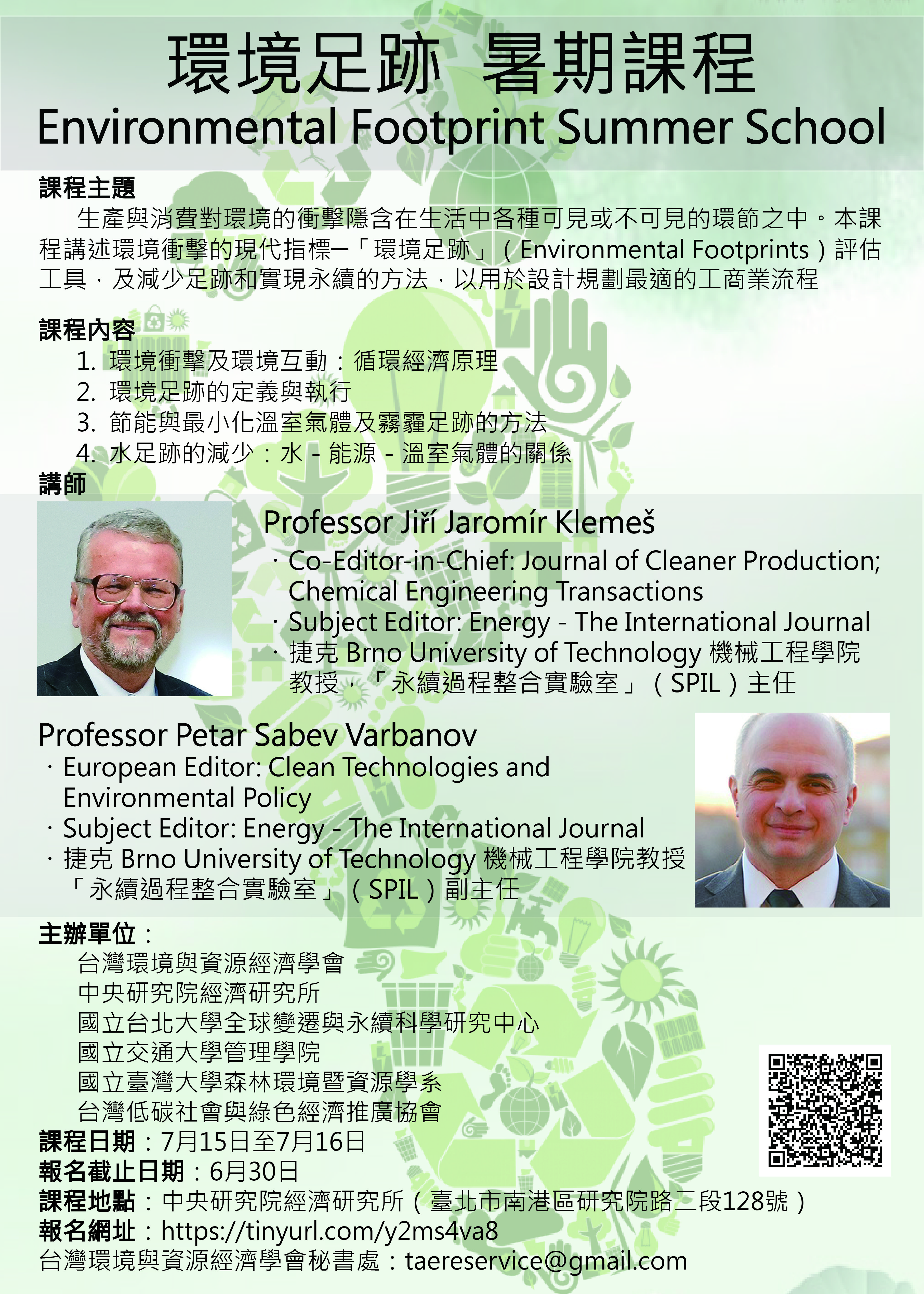
July 15-16, 2019
Organizers:
- Taiwan Association of Environmental and Resource Economics
- Institute of Economics, Academia Sinica
- Center for Global Change and Sustainability Science, National Taipei University
- College of Management, National Chiao Tung University
- School of Forestry and Resources Conservation, National Taiwan University
- Taiwan Association for Low Carbon Society an Economy
Venue: Institute of Economics, Academia Sinica, 128 Academia Road, Section 2, Nankang, Taipei, Taiwan
DEADLINE FOR APPLICATION: June 30, 2019
 |
|
 |
Professor Petar Sabev Varbanov
|
Abstract
The course offers an overview of the modern metrics of environmental impact, called "Environmental Footprints," and the methods for their reduction and achieving sustainability. Environmental Footprint assessment tools are very useful for optimising the performance of industrial and business processes. Often they are also referred to as "Ecological Footprints."
The course has several major parts:
Part 1. Introduction to environmental impacts and interactions, foundations of Circular Economy
This part introduces the topics, starting from a discussion of the main issues and problems of environmental pollution and depletion of natural resources from their natural storages. The emphasis is put on the need for circularity of the resource use and product/by-product reuse, and implementing the Circular Economy principles and strategy, to minimise resource extraction and waste discharge.
Definitions of sustainability and sustainable development are given. The Life Cycle thinking and the fundamentals of Life Cycle Analysis (LCA) are introduced, distinguishing between direct, indirect and total effects. The part includes the Environmental Performance Strategy Map – a concept that allows visualising and simultaneously optimising the environmental and economic performance indicators of human activities – an industrial site or other business activities.
The part concludes with the main principles and indicators important for measuring environmental impacts.
Part 2. Environmental Footprints – Introduction, definitions, implementation
This part introduces in more detail the key footprints, important for evaluating and altering the performance of industrial, business and societal systems in terms of environmental impacts and sustainability. The indicators include those for Greenhouse Gas (GHG), Water Footprint, Nitrogen Footprint, and others. The part concludes with presenting the possible measures and degrees of freedom to reduce footprints.
Within that context, the global energy and water flows are overviewed, including the flows of Virtual Water and Virtual GHG Footprints.
Part 3. Methods for Energy Saving and GHG and Haze Footprint Minimisation
This part starts by discussing case studies that provide examples of the benefits from concerted strategies for Energy Saving and further measures for GHG/Haze Footprint minimisation. The Process Integration principle is explained, clearly showing its coherence with the resource/waste hierarchy and the use of renewables as a footprint reduction tool. That is followed by the concepts, principles, and methods of Heat Integration and Pinch Analysis, for the simultaneous reduction of footprints and resource intake. The techniques include Data Extraction, Heat Recovery Targeting, Design of Heat Exchanger Networks, integration of energy-intensive processes, Total Site Heat Integration, Advanced Process Integration Techniques and energy storage methods, for improving the energy savings.
Part 4. Reduction of Water Footprint, Water-Energy-GHG Nexus
This part provides an introduction to Water Integration and nexus considerations. It starts with Data Extraction concerning water use, Water Network Design, discussion of water quality issues and implications, Water Pinch Analysis, water system analysis, Maximum Water Recovery Targets, design of Water Reuse Networks. Further techniques are discussed – the "Source/Sink Composite Curves" method for water targeting, the significance of the Water Pinch, Cost-Effective Minimum Water Networks – design and retrofit.
Further, the Water-Energy Nexus for industrial sites is considered, giving a case study for using the Nexus as a synergy mechanism for energy and water demand reduction.
Recommended literature
- Klemes, J. J. (Ed.). (2015). Assessing and measuring environmental impact and sustainability. Butterworth-Heinemann.
- Klemeš, J. J., Varbanov, P. S., Alwi, S. R. W., & Manan, Z. A. (2018). Sustainable Process Integration and Intensification: Saving Energy, Water and Resources. Walter de Gruyter GmbH & Co KG.
Participation fee
The fee covers lecturer expenses, downloadable course material, morning and afternoon teas, and two lunches and one dinner included in the School programme. It does not cover accommodations.
- TAERE members: Free of charge (to become a member)
- Non-members: The participation fee is 100 USD (or 3,000 TWD) per person for non-members.
Course outline. Here
Summer School Program. Here
Information on how to apply are available on the Summer School website.
Chinese website. Here
Summer School Secretariat: Email住址會使用灌水程式保護機制。你需要啟動Javascript才能觀看它
2018暑期課程:行為環境經濟學
- 詳細內容
- 分類:暑期課程資訊
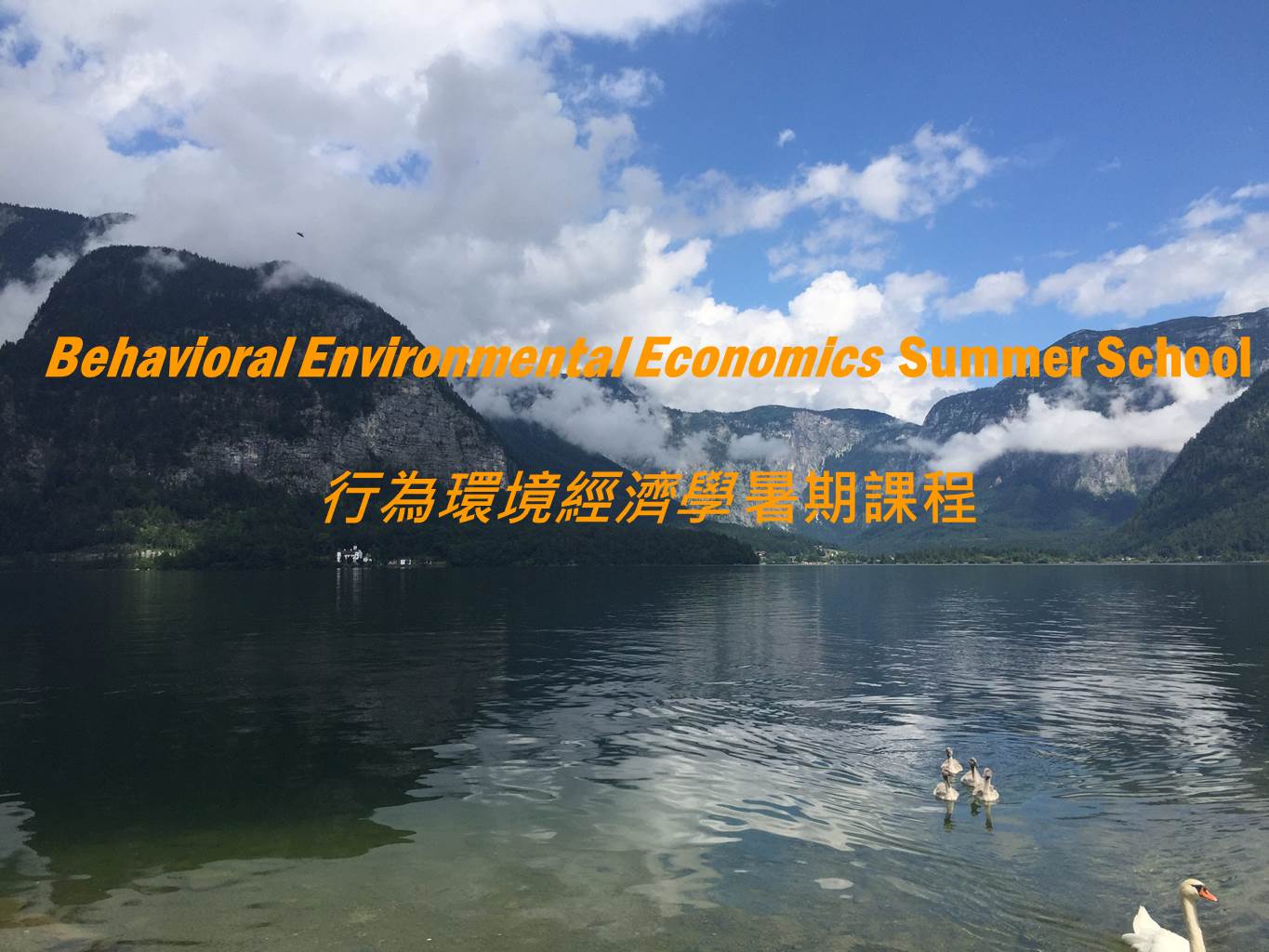
主辦單位 Organizers:
台灣環境與資源經濟學會
Taiwan Association of Environmental and Resource Economics
中央研究院經濟研究所
Institute of Economics, Academia Sinica
國立臺北大學全球變遷與永續科學研究中心
Center for Global Change and Sustainability Science, National Taipei University
行政院原子能委員會核能研究所
Institute of Nuclear Energy Research, Atomic Energy Council, Executive Yuan
課程日期 Date:
2018年8月30日至31日(August 30-31, 2018)
地點 Place:
中央研究院經濟研究所,台北市南港區研究院路二段128號
Institute of Economics, Acdemia Sinica
台灣環境與資源經濟學會、中央研究院經濟研究所、國立臺北大學全球變遷與用續科學研究中心和行政院原子能委員會核能研究所將在2018年暑期提供「行為環境經濟學」的課程,適合對行為經濟學及環境與資源經濟學有興趣的學生、研究人員和專業人士。
課程內容:
環境經濟學的規範性分析通常對環境問題提出以經濟效率和本益分析為規範標準的政策方案。但事實上,環境經濟學家所推薦的標準政策工具,例如污染稅、碳稅、能源稅,常常不受大眾歡迎;積極對抗全球暖化的排碳管制方案也常受冷遇;一般人對許多環境風險的評估也常和「客觀的」風險指標有所差距。這些分歧雖然一部分可由個人利益與社會集體利益之間的不一致來解釋,或是部分歸因於社會大眾對「效率性」政策之所得重分配效果的憂慮,但現代行為經濟學已提出大量的證據,顯示個人的偏好可能不像標準經濟理論所定義的那般狹隘。而這些關於人性的新發現和新理解,可能對環境政策的設計產生深刻的影響。因此,台灣環境與資源經濟學會和中央研究院經濟研究所舉辦2018年的暑期課程「行為環境經濟學」,其目標是,為參與者提供行為經濟學的全面性概覽及其在環境課題方面的應用。
2018年暑期課程的主題包括:
- 行為經濟學和環境課題的關係概覽:行為經濟學在環境課題與環境政策方面的應用,特別是觀察到的行為和標準經濟理論之間的不相容性。例如,看重「沉沒成本」的謬誤(sunk cost fallacy),偏愛現狀的傾向(status quo bias),起始訊息的錨定效應(anchoring),可替代性和心理帳戶(fungibility and mental accounting)。
- 仰賴參考架構的偏好型態:「非標準型偏好」的證據與「非標準型偏好」對環境評價的影響。例如,損失規避的傾向(loss aversion),「最高願付價值」(Willingness-to-Pay)和「最低報償要求」(Willingness-to-Accept)之間的差距。並討論這類偏好型態的政策含義。
- 從行為理論來看跨期選擇:例如,指數折現和雙曲折現(exponential and hyperbolic discounting),偏好當下的傾向(present bias)和承諾機制(commitment devices),參考架構的依賴與折現問題。
- 公平意識和社會偏好:例如,利他行為,信賴與互惠,社會文化規範,以及有關這些問題的實證發現和政策含義。
- 未來的可能發展:行為觀察證據的潛在角色和局限性;政策設計課題;行為環境經濟學的未來可能研究重點和方向。
The Taiwan Association of Environmental and Resource Economics (TAERE) and the Institute of Economics, Academia Sinica and the Center for Global Change and Sustainability Science, National Taipei University and Institute of Nuclear Energy Research, Atomic Energy Council, Executive Yuan are pleased to announce the first TAERE Summer School in Environmental and Resource Economics for students, researchers and professionals.
The School will take place from August 30 to 31 at the Institute of Economics, Academia Sinica in Taipei, Taiwan. The main theme covered by the 2018 Summer School is Behavioral Environmental Economics.
Normative environmental analyses based on the efficiency and cost-benefit criterion at times implied unambiguous policy treatments of environmental problems. However, standard policy instruments such as the Pigovian tax recommended by the environmental and public economists were often unpopular. Aggressive policy actions against climate change also often met with a cold acceptance. Citizens’ assessment of the riskiness of many environmental issues also diverged from many “objective” risk measures for them. While some of these divergences could be explained by the disparity between the individual interest and the collective social interest, or by concerns about the potential re-distributional effects of some “efficient” policies, modern behavioral economics has found abundant evidence that individuals’ preferences may not be so narrowly defined as in the standard economic theory. And these findings about human nature could have profound implications on the design of environmental policies. The aim of TAERE 2018 Summer School is to provide participants with a comprehensive picture of behavioral economics applied to the environmental issues and the basic toolkit required to conduct relevant researches. Therefore, the topics of the 2018 Summer School include:
- Behavioral economics and the environmental issues: Overview of the current and potential role of behavioral findings in environmental economics and policy, with specific reference to the incompatibility between the predictions of the standard economic theory and observed behaviors (e.g., sunk cost fallacy, status quo bias, anchoring, fungibility and mental accounting).
- Reference dependent preferences: Environmental valuations and the empirical evidence of “nonstandard” preferences (e.g., reference dependent preferences like loss aversion and the observed disparities between valuations of gains and losses; disparities between the Willingness-to-Pay and the Willingness-to-Accept). Policy implications will be discussed.
- Intertemporal choice in the perspectives from the behavioral theories: Intertemporal preferences and discounting values of future outcomes (e.g., exponential and hyperbolic discounting; present bias and commitment devices; reference dependence and discounting of future gains and future losses).
- Fairness and social preferences: E.g., altruism, trust and reciprocity, and social norms; empirical findings and policy implications.
- “Where are we going?”: Potential role and limitations of behavioral findings and policy design; possible future priorities/directions for environmental behavioral economics.
講師 Instructors:
Jack L. Knetsch教授,加拿大Simon Fraser大學
Y. Eko Riyanto教授,新加坡南洋理工大學
議程暨影片 Program and Video Review:
| 08月30日(星期四)/ August 30, 2018 | |
| 時間(Time) | 議程(Program) |
| 08:30~08:50 | 報到 Registration |
| 08:50~09:00 |
|
| 09:00~12:30 |
講師/ Instructors:
|
| 12:30~14:00 | Lunch & Discussion |
| 14:00~17:30 |
講師/ Instructors:
|
| 08月31日(星期五)/ August 31, 2018 | |
| 08:40~09:00 | 報到 Registration |
| 09:00~12:30 |
講師/ Instructors:
|
| 12:30~14:00 | Lunch & Discussion |
| 14:00~17:30 |
講師/ Instructors:
|
課程讀物 Reading List:<按此前往>

